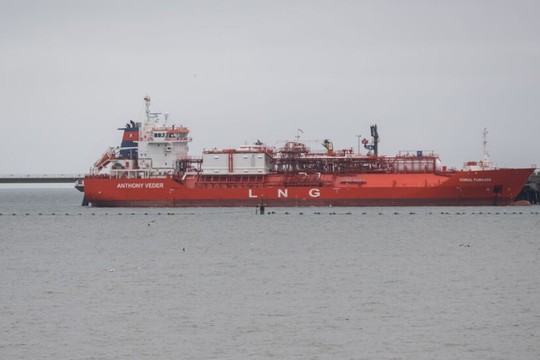A terminal for liquified natural gas floating stations near Wilhelmshaven, Germany
Photo: Getty Images
Germany is still trading Russian liquefied natural gas, as canceling the contract of a nationalized firm could cost billions of euros — creating a dilemma for Berlin and potentially benefiting Moscow, Bloomberg writes.
SEFE GmbH — a former unit of Gazprom PJSC — is shipping Russian LNG under the terms of a legacy contract that existed before Germany took over the company last year. The cargoes, which aren’t subject to international sanctions, are bound for India.
Still, the trade has become a headache for Germany, which has explicitly said it won’t use gas from Russia in the fallout of the war in Ukraine. Berlin is facing sharp criticism over concerns that a government-run company still has ties to Moscow, despite its political rhetoric.
However, breaching the contract could cost German taxpayers at least €10 billion ($10.6 billion) — significantly more than the government’s bailout of SEFE and a price tag so high that it makes such a move unlikely, according to people familiar with the matter.
The figure is a rough estimate of damages and penalties if Russia were to successfully sue the firm in an international arbitration court, said the people, who declined to be named as the business is private. The economy ministry is still investigating the issue, they said.
SEFE has a 20-year contract to deliver LNG from the Yamal facility in Siberia — a holdover from its Gazprom days — that started in 2018. At current market prices, that deal is worth about €2 billion annually, according to Bloomberg calculations. The company has to pay for the Russian LNG regardless of whether it takes possession of the cargoes, under the terms of its arrangement.
“Like every long-term supply contract, this old SEFE contract also contains very strict contractual penalties and liability consequences in the event that SEFE does not fulfill its contractual obligations,” a SEFE spokesperson said, declining to comment on specific conditions.
If the trader doesn’t load the fuel at Yamal, Russia can still sell the cargoes elsewhere, according to the people familiar with the matter. That means Moscow could potentially rake in money twice — from the sale and from any penalties if SEFE were found to be in breach of contract, they said.
SEFE also has a separate, long-term obligation to supply India’s GAIL Ltd., and finding alternative cargoes could end up being more expensive than the Russian supply.
SEFE earlier this month picked up separate cargoes of Yamal-produced LNG at the Belgian port of Zeebrugge, both set to be delivered to India in November. The company doesn’t plan to import Russian LNG into Germany or any other European Union country.
Still, the German government is engaging in “contradictory behavior,” according to Christian Görke, the oppositional Left Party’s finance expert. On one hand, a German state-owned firm is buying, marketing and selling Russian gas, he said. On the other hand, government officials are calling for “further, tougher sanctions against Russia.”
read more in our Telegram-channel https://t.me/The_International_Affairs

 11:50 25.10.2023 •
11:50 25.10.2023 •























